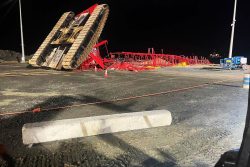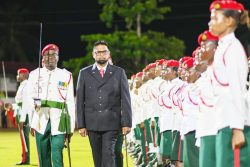Democracy doesn’t seem to be doing at all well around the globe at the moment, and particularly not in this hemisphere. We should be particularly concerned about what happened in our neighbouring state last Sunday, since it seemed so closely to resemble a reprise of what occurred in the US two years ago. If no one was prepared for the storming of Congress in Washington on January 6th, 2021, there were in contrast ominous signs of trouble in the offing prior to the trashing of the Congress, the Supreme Court and the Presidential Palace in Brasilia.
There was one major difference between the two events and that is the attack on the Capitol took place before President Joe Biden had officially been declared to have won the election in a bid to prevent that from happening, whereas in the case of Brazil President Luiz Inácio Lula da Silva had already been sworn in the week before. It is true his opponent Mr Jair Bolsonaro flew out to Florida before the ceremony in order to avoid having to place the presidential sash on the new head of state as is traditional, but despite that everything went off smoothly, and perhaps that lulled some into a state of complacency.
The aim of the Brazilian rioters was to persuade the military to stage a coup and overturn the election on the grounds that it had been fraudulent. To that end Mr Bolsonaro’s hard-line supporters had been camping outside military barracks in various parts of the country, including Brasilia itself, but the police had done nothing to remove them, while the military had not declared they would refuse to support a coup, although prior to the poll they had said they would uphold the constitution. Nevertheless, these were unhealthy developments in a nation where the army had once ruled and where the former President liked to hark back to the period of the dictatorship as good years.
This occurred in a context with which Americans in particular are now all too familiar, and that is Mr Bolsonaro and his sons had for years been undermining faith in the institutions of the country, in more recent months suggesting the election was rigged. Social media was their preferred avenue of feeding the public with misinformation of various kinds, and it is no accident that their modus operandi echoed that of Mr Donald Trump (Mr Bolsonaro is known by the moniker ‘Trump of the Tropics’) since they were in contact with Trump associates such as Mr Steve Bannon, who openly admired Mr Bolsonaro’s tactics.
According to the Washington Post Mr Trump met Mr Bolsonaro’s son Eduardo at Mar-a-Lago in November where he spoke both to Mr Bannon and the former President’s advisor Mr Jason Miller. The BBC reported that as in the US in 2020, attention was focused on the electronic voting machines, and that Mr Bannon had posted messages exhorting the Brazilian authorities to “release the machines”. The news agency went on to say that one of the banners held by the rioters who stormed the Congress on Sunday read, “We want the source code”. This was an allusion to their belief that the voting machines had been hacked to deny Mr Bolsonaro victory.
As for organising the assault on Congress, that was effected through social media, although on some of the sites code words were used, such as an invitation to attend ‘Selma’s Party’, which BBC disinformation monitors explained was a play on the word ‘selva’ meaning jungle in Portuguese, that was also used by the military as a war cry or greeting. There were others too, while some posts offered transportation to Brasilia in the form of “free buses” and “everything for free: Water, coffee, lunch, dinner.” It might be noted that the situation was not helped by the fact that after Mr Elon Musk acquired Twitter, he fired all the moderation staff in São Paulo, retaining only the sales people.
President Lula has said they would find out who had funded the riot, while apart from that questions have automatically arisen as to how it was the inauguration of the new President had passed off so smoothly, and yet the most important government buildings were left virtually unprotected a week later. And why was it, Brazilians are asking, that 100 buses with the rioters were given permission to enter Brasilia. Videos have been shown of some police laughing and taking photos with the rioters in the grounds of the Congress in the background. Another one showed a policeman giving a thumbs-up sign to the invaders, while the president described the police as guiding the insurrectionists along the main esplanade. It must give the government and others a certain feeling of discomfort about the loyalties of the security services. In a much less acute way it is not a situation with which we here are totally unfamiliar.
In the aftermath of this catastrophe some senior officials have been arrested, including Public Security Chief Anderson Torres. Mr Ricardo Cappelli who has now been appointed to run security in Brasilia was reported as telling CNN that the inauguration was a success, but after that Mr Torres was appointed, and he dismissed the command and then went abroad – to Florida, as it happens. Mr Cappelli was quoted as describing it as a “structured sabotage operation.” Mr Torres has denied that he had any part to play in the riots. Colonel Fábio Augusto Vieira, the military police commander has also been dismissed.
And if none of the security chiefs are admitting they had anything to do with those who came to vandalise Brazil’s most important public buildings, and, it might be added, the art works inside including an antique French clock of which only two other examples exist in the world, then Mr Bolsonaro himself is certainly distancing himself from events. He has condemned the actions of his supporters, but has still not conceded defeat in October’s election. He will not be the man to help heal the deep rift in the society.
But then that is the problem with many modern democracies: they are highly polarised, something which may owe a good deal to social media as well as populist politicians who lack a grasp of how a democratic polity works. President Lula is likely to find that whatever plans he had for the nation may be overtaken by other issues which cannot be ignored. The space where politicians and their supporters met in the centre and hammered out compromises is dwindling in so many societies, and they will in consequence become more prone to teeter on the edge of confrontation. The situation is aggravated where there is a loss of trust in institutions and their processes. In an atmosphere of mistrust it will not matter what the democratic systems are for changing governments or how foolproof they are if a segment of the population in the teeth of the evidence still believes they have been corrupted.
The lesson is that if a Donald Trump or a Jair Bolsonaro wants people to believe an election has been or will be stolen, they will keep repeating it, and eventually some of their supporters will believe. We are not immune to that phenomenon either, although certain politicians in this country have not had to be reliant on social media for their purposes. The cases of the US and Brazil are dramatic, but even though our situation is different, we still have things we can learn from those events if both sides of our own polarised divide had the humility and the patience to pay attention.





